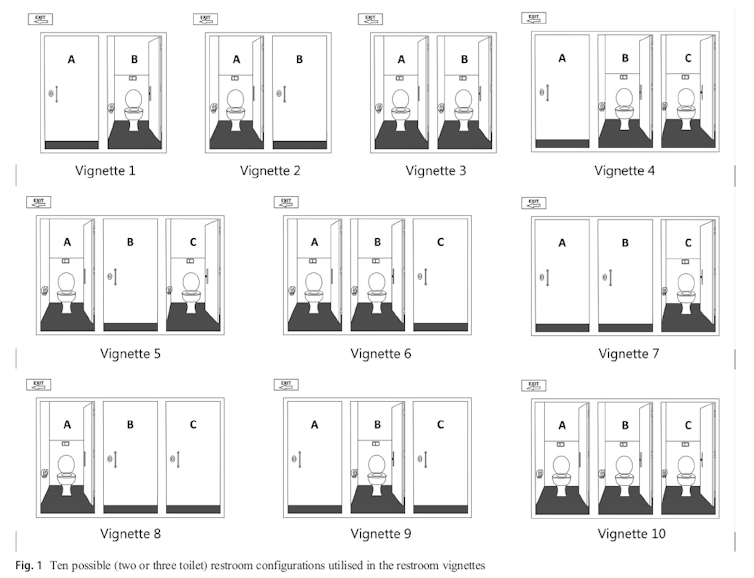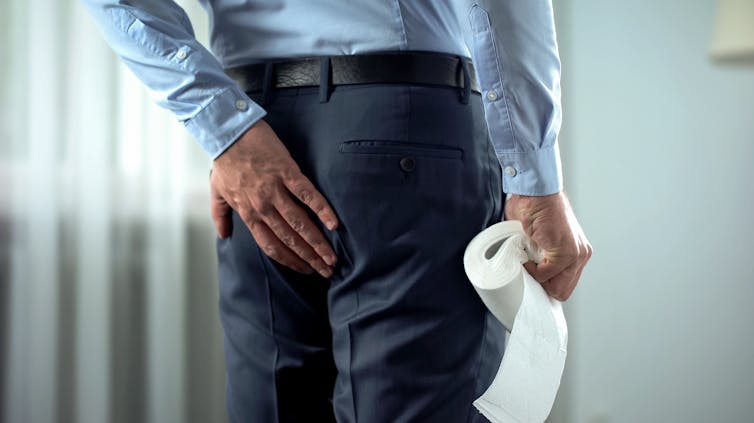‘It’s okay to sleep at work’: new health campaign highlights common source of anxiety
For most people, the daily or daily ritual of having a bowel movement is not something we think about much. But for some people, the need to go “secondary” in a public restroom or at work can be stressful and overwhelming.
In order to recognize the discomfort people may feel while having a bowel movement at work, the Queensland Department of Health recently launched a social media campaign with the message “It’s OK to poo at work”.
The campaign gained significant traction on Instagram and Facebook. It has been praised by health and marketing experts for its humorous take on an illegal topic.
The colorful Instagram post is accompanied by words warning about the health risks of “holding it”, including haemorrhoids and other gastrointestinal problems. The image also says:
If you find it very difficult to be around other people, you may have parcopresis.
What is Parcopresis?
Parcopresis, sometimes called “bowel of shame”, occurs when people have difficulty or are unable to defecate in public toilets for fear of being scrutinized by others.
People with parcopresis may have difficulty going to the toilet in public places such as shops, restaurants, work or school, and even at home when friends or family are around.
They may fear being judged by others for unpleasant smells or sounds when they have a bowel movement, or how long it takes them to move, for example.
Living with a bowel condition (at least four in ten Australians do) can contribute to parcopresis due to anxiety about the need to use the toilet frequently, and perceived judgment from others when they do. . Other factors, such as past negative experiences or accessibility challenges, may also play a role.

Automotive Films / Shutterstock
For those with this disorder, anxiety can manifest as rapid heart rate, rapid breathing, sweating, muscle tension, embarrassment, nausea, tremors, or a combination of these signs. They may have ongoing concerns about the circumstances in which they may need to use a public toilet.
Living with parcopresis can affect many aspects of life and overall quality of life. For example, patients may have problems related to work, relationships and social life. They may avoid walking or attending certain events because of their symptoms.
How common is parcopresis?
We don’t know exactly how common parcopresis is, because of the difficulty in measuring this behavior. It is not necessarily easy or convenient to follow people to see if they use or avoid public toilets (and their reasons if they do). Also, watching bathroom scenes can change a person’s behavior.
I did a study to try to better understand how common parcopresis is. The study involved 714 university students. I asked participants to respond to a series of vignettes, or situations.
In each case the participants were advised that they were in a local shopping center and needed to have a bowel movement. In the vignettes, the bathrooms (which were recently cleaned) had two or three toilet configurations. Each vignette was different in the arrangement of available stalls.

First published in Current Psychology, Volume 42, pages 1762–1772, 2023, by Springer Nature.
The evasion rate was over 14% overall. But there was a chance that participants would avoid using the toilet when other booths were occupied.
About 10% avoided going to the toilet when all were available. This increased to about 25% when only three toilets were available. Men were significantly less likely to avoid walking than women across all vignettes.
For those who avoided the toilet, many said they would go home to pee, use an available toilet for people with disabilities, or return when the toilet was empty.
Parcopresis at work
In workplaces, anxiety rates about using shared bathrooms can be high for several reasons.
For example, people may feel more confident about their bodily functions being heard or noticed by colleagues, compared to strangers in a public toilet.
People may experience guilt, shame and fear of being judged by colleagues or superiors if they need to use the toilet for long or frequent trips. This can be very effective for people with gastrointestinal disease.
Less anxiety about the toilet
Using a public toilet reasonably can cause anxiety or discomfort. But for a small minority of people it can be a real problem, causing great distress and affecting their ability to participate in daily activities.
If using the bathroom at work or in a public place makes you anxious, be kind to yourself. Several methods can help:
-
identify and challenge negative thoughts about using public toilets and remind yourself that using the toilet is normal, and that most people do not consider others in toilets.
-
try to manage stress with relaxation techniques such as deep breathing and progressive muscle relaxation, which involves tensing and relaxing different muscles around the body.
-
gradual adaptation can help, which means visiting public toilets at different times and places, so you can develop more confidence in using them.
-
use support or distraction strategies when going to the toilet. These can include listening to music, watching something on your phone, or focusing on your breathing.
If you feel that parcopresis is having a big impact on your life, talk to your GP or a psychologist who can help you find the right treatment options. This may include cognitive behavioral therapy.
#sleep #work #health #campaign #highlights #common #source #anxiety
